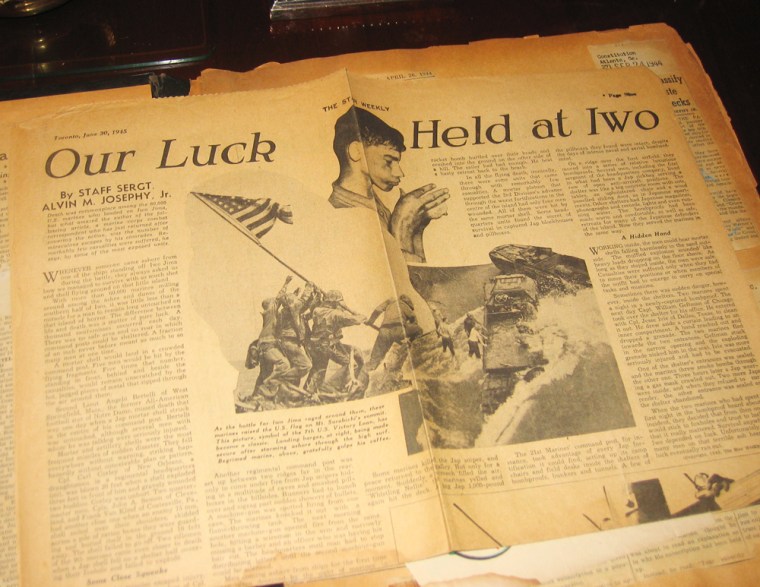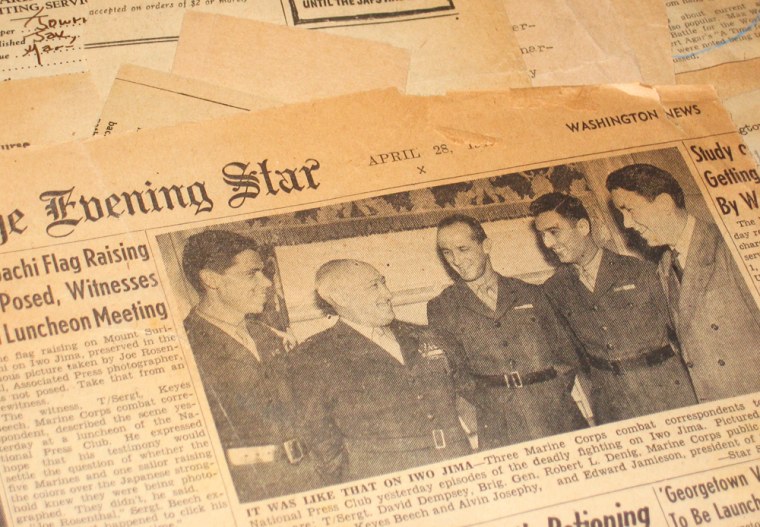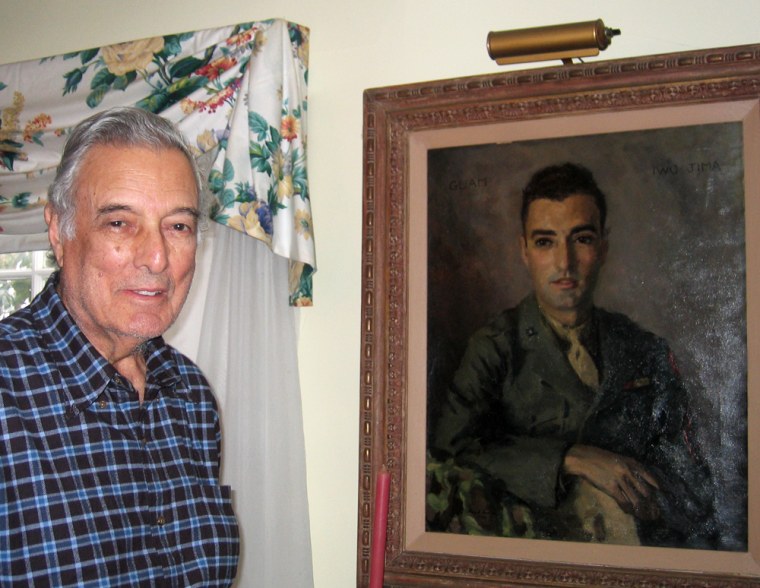“Iwo Jima was the most ferocious battle the Marines have ever fought. And they were treating it that way while we were still fighting,” said Alvin M. Josephy Jr.
As a Marine Corps combat correspondent on Guam, Saipan and Iwo Jima during World War II, Josephy, 89, saw his fair share of the battlefields of the Pacific and knew a ferocious fight when he was in one. During the Marines landing at Guam, 26 men out of 32 who were in his boat were struck by enemy fire walking across the reef to reach land.
But the intensity of the landing at Guam was far surpassed by the Marines' 36-day battle to capture the small, but strategically significant, volcanic island of Iwo Jima, a battle remembered this week, the 60th anniversary.
More than 6,000 of the 75,000 U.S. troops who landed on the island were killed and another 20,000 wounded; some 20,000 Japanese defenders died, leaving a little more than 1,000 survivors.
U.S. commanders had decided that control of the island was critical to secure an airfield as a base for fighter planes escorting U.S. bombers headed to mainland Japan and to provide a haven for crippled aircraft.
Combat correspondents
As part of the unique group of Marine Corps combat correspondents, Josephy’s job was not just to figure out how to survive the battle, but to gather the sights, sounds, and stories of the fight to send back home.
During World War II, all branches of the armed services deployed combat correspondents. But, “the Marines were the best organized – the best and most sophisticated news organization in the military – not to knock the other branches,” said Jack E. Pulwers, author of “The Press of Battle: The GI Reporter and the American People.”
At the start of World War II, Brig. General Robert L. Denig, a World War I veteran, came out of retirement to take charge of the Marine Corps Public Affairs Division. Through active recruitment initially at Washington, D.C., newspapers, the Marine Corps quickly built up a sophisticated network of professional journalists.
Known as “Denig’s Demons,” most of the former newspaper and radio newsmen went through full boot camp at Parris Island in South Carolina, or in San Diego, before they were given the rank of sergeant and sent off to join a combat unit in the Pacific to fight with the troops and send back stories that could be placed in mainstream media.
As a former newspaperman for the Herald Tribune and a radio man for WOR radio, Josephy was a seasoned journalist.
He filed hundreds of stories from the Pacific with headlines ranging from “1,000 Japanese Against 30 American Marines - But U.S. Tanks Square Odds,” and “Brooklyn Leatherneck Risks Life to Save Buddies on Iwo,” to “Guadacanal Dinner Dance Done Up A La Emily Post.”
He was also the first to record a ship-to-shore landing at Guam, for which he later received a Bronze Star for “heroic achievement.”
Stories from front lines ‘vital’ to the war effort
These stories helped prepare America for a long war, Pulwers believes. The combat correspondents "knew about the lethality of war and they knew how to tell the American people the truth that this was going to be a long, hard, combat-oriented thing to endure and that there would be many lives lost.”
The correspondents also provided information to the troops themselves, telling them "what was going on with their units and why they were fighting the war, what they were trying to accomplish,” Pulwers explained. "And that combination of the two made the combat correspondent absolutely invaluable in winning the war.”
Pulwers believes the combat correspondents' praise for the heroism of the common GI helped make the “enlisted man king.” And it also helped smooth the passage of what Pulwers said was “the greatest legislation for the troops ever seen by man: the GI Bill.”
Battle that just 'went on and on'
For Josephy, the battle for Iwo Jima “went on and on, and was just horrible.”
He survived the attack with little more than a few bruises from being tossed in the air by a Japanese mortar, but many of his friends and fellow Marines were injured or killed.
One close friend in particular, Reid Chamberlain, his foxhole buddy on Iwo Jima, had eluded death once before on the island of Corregidor in the Philippines by escaping to a nearby island and leading a Filipino guerrilla band behind Japanese lines. The Marines notified his mother that he had died, though she refused to believe them, Josephy said.
Chamberlain eventually returned to the United States, but finding that he couldn’t fit into civilian life while the war was still on, he re-enlisted in the Marines and found himself on Iwo Jima. He was walking across what he thought was a secure part of the island when he was shot and killed by an enemy sniper hidden among the rocks.
Despite the tragedy unfolding all around, Josephy was able to enjoy at least one moment of levity.

Weeks into the battle, when the first mail drop arrived, Josephy received a letter from his mother, who had no idea where he was.
The letter enclosed a copy of the New York Sun with Joe Rosenthal’s famous photo of the U.S. flag raising on Mt. Suribachi splashed across the front page and a note from his mother saying, “Thank God you’re not on Iwo Jima.”
As Josephy recalls it, he was in a captured Japanese pillbox with Rosenthal when he received the letter from his mother.
He showed it to the photographer and gave him his first look at the attention it was getting back home.
Everyday ‘a bonus’
Once the battle of Iwo Jima was finally winding down, Josephy and four other combat correspondents were ordered back to the United States for special duty. They were sent home to go on speaking and bond-selling tours to explain to the American people the importance of capturing Iwo Jima and that the tremendous cost in casualties was in fact to save lives and finish the war sooner.
In addition, he wrote his own book, “The Long and the Short and the Tall," about the Marines in combat on Guam and Iwo Jima and the many stories of sacrifice by the men he knew who were wounded or died in the Pacific.

After the war, Josephy became a successful editor at Time Magazine and American Heritage. He also became one of the pre-eminent historians on the American West and American Indians as the author of numerous books including “The Civil War in the American West,” and “500 Nations: A History of North American Indians,” among many others.
But, his time on Iwo Jima has always remained the most important experience of his life.
In his autobiography, “A Walk towards Oregon,” he summed up his feelings about the battle of Iwo Jima: “I was filled with guilt over those I was leaving behind and felt that from now on, no matter how long I still lived, it would all be bonus.”
